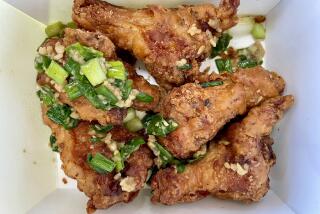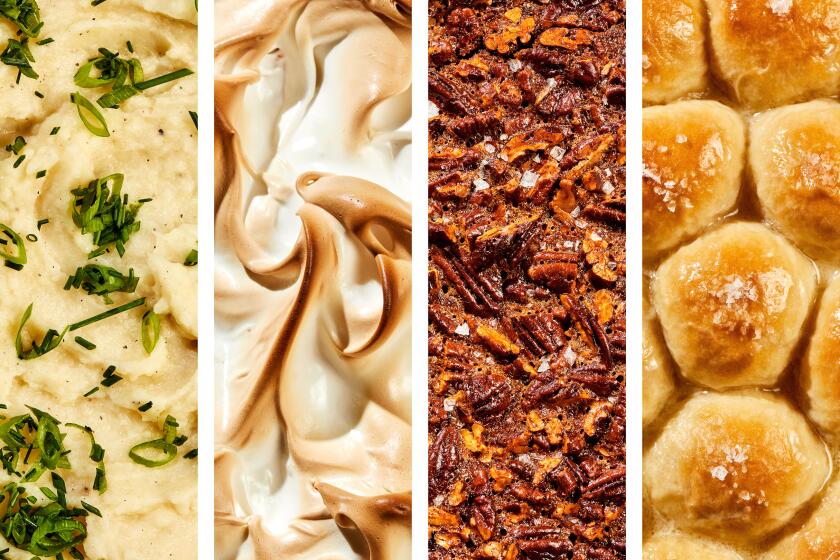Nigerian jollof rice and other joys at Mid-City’s Aduke African Cuisine
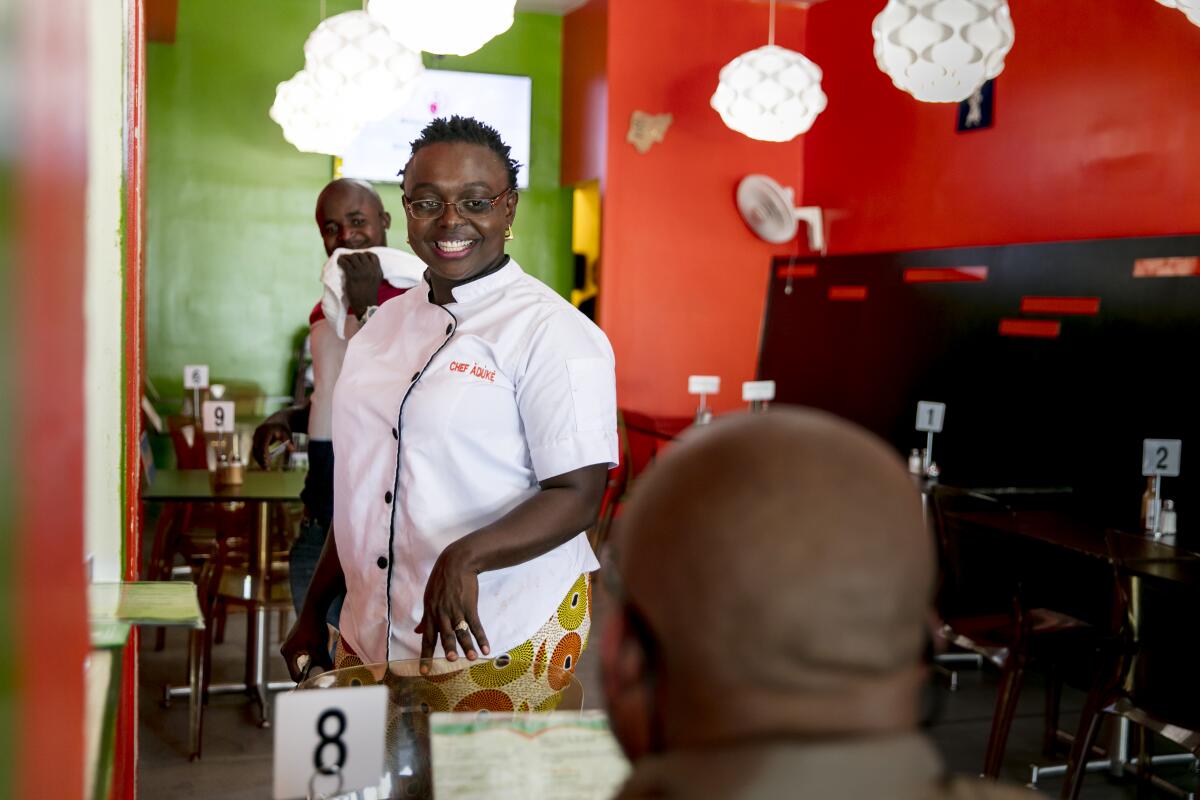
Aduke Oluwafunmilayo Oyetibo’s egusi with goat meat rises from its plate like a jagged hill bathed in sun rays — a terrain of golds and reds and browns threaded with flashes of green. Ground melon seeds form the stew’s terra firma; they swell as they cook until they resemble flecks of scrambled egg. Some versions of egusi are brothy; Oyetibo’s is creamy. She builds a mantle of flavors with tomato, garlic, ginger and iru, an umami blast of fermented locust beans. A healthy drizzle of red palm oil encircles the dish with the twilight color of carrot-beet juice.
After every bite there’s a soft afterglow of spice: maybe alligator pepper? Oyetibo nods yes, and then casts a playful side eye: “So many questions! Are you planning to start a Nigerian restaurant?”
She leapt into the business herself in March, opening Aduke African Cuisine near the Mid-City intersection of Pico and La Cienega boulevards, surrounded by a paint store, a bridal shop and a day spa. Oyetibo prepares dishes she learned growing up in Ilesha, a town in the Osun state of southwest Nigeria.
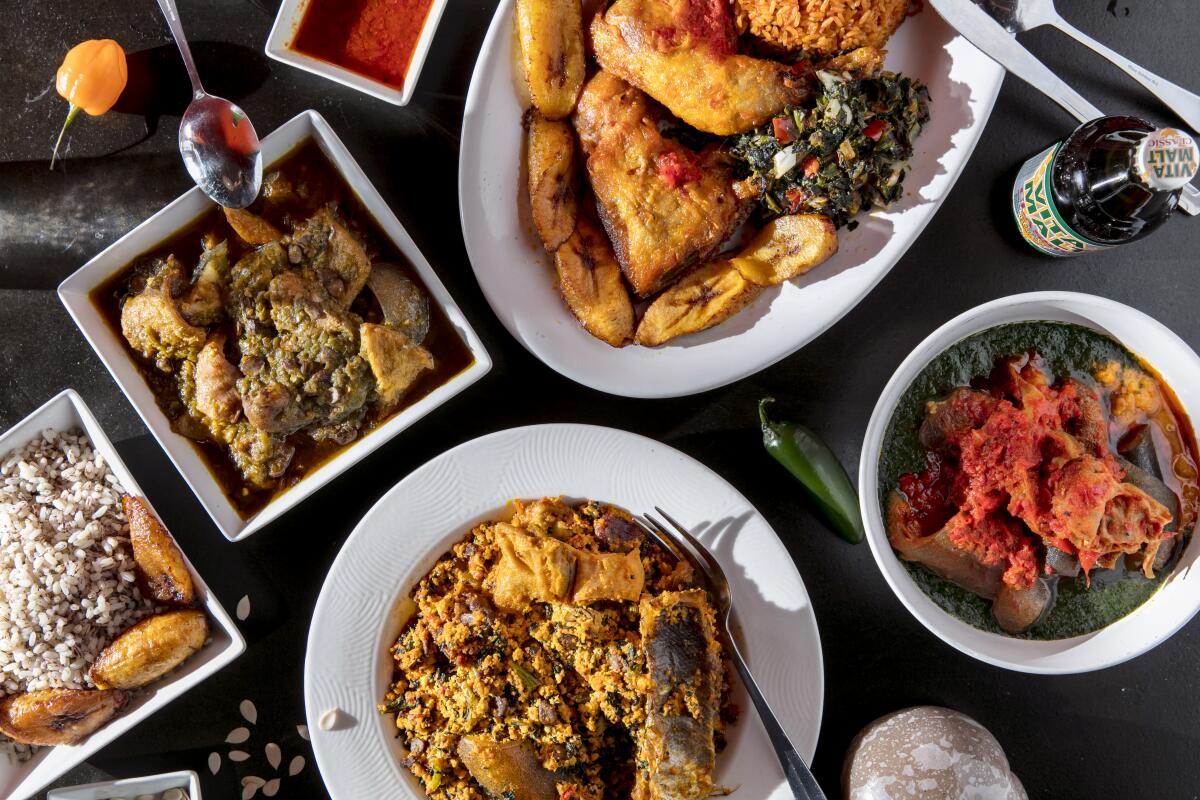
The restaurant has been her goal since she arrived in the United States six years ago. She worked as a caregiver and behavior technician and moonlighted to break into the professional cooking arena: She began by seeking out West African restaurants throughout Los Angeles and selling them fried snacks, including chin chin (cracker-like morsels often scented with nutmeg) and fluffy, doughnut-like puff puffs.
Now a server at Aduke brings out a bowl of puff puffs straight from the fryer while you wait for your order. The rectangular dining room is compact, with 13 tables; the walls vibrate candy-apple red and an emerald shade of green that evoke the flag of Nigeria.
Oyetibo mostly stays behind the stoves — much of the time she’s busy managing catering orders as well as cooking for restaurant customers — but she occasionally sweeps through to greet guests. You know when she’s around: Her smile could dissipate fog.
Stews and rice dishes make up the core of the menu. Requesting a stew prompts two questions from a server: What kind of meat (usually chicken, fish, beef or goat) would you like and, just as important, what kind of “swallow” to accompany it? Swallow is modern slang for the traditional pounded starches used as edible tools in West African cuisines. I deflect these inquiries back to the staff, asking for pairings that reflect typical Nigerian tastes. With egusi, the recommendation is fufu — pulverized yam with the buttery smoothness of mashed potatoes.
Like all of the swallows, the fufu comes boiling hot, shaped into a ball, wrapped in plastic; I juggle it between my fingers until it cools enough to unwrap. I mirror the way I see other diners eating in the restaurant: With my right hand I swipe off a clump of fufu about the size of a silver dollar, flatten it with my thumb and make an indentation in the center, and then scoop up mouthfuls of stew.
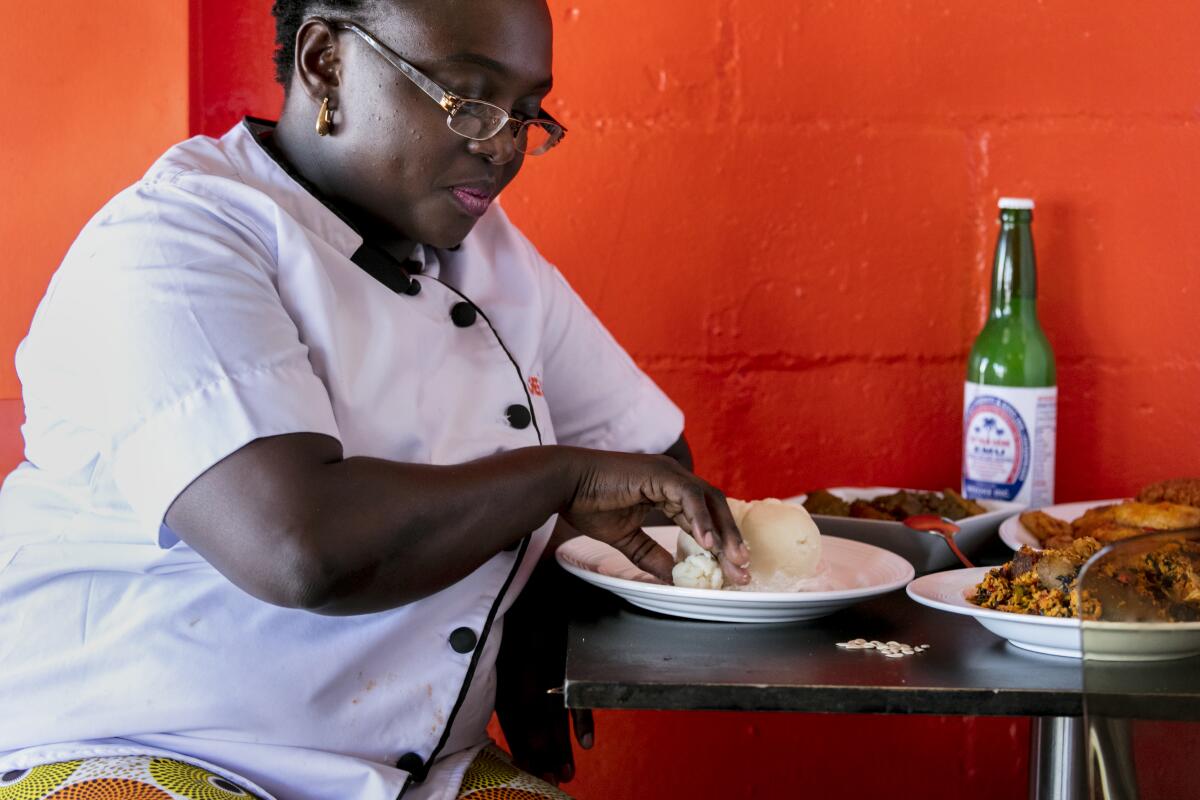
Ila alasepo, a silky okra stew, recalls a soup I relish in travels to Charleston and Savannah; it’s a reminder of West Africa’s clear lineage in the cooking of the American South. Order it with goat meat and amala, a swallow made from a variety of dried yam that turns a distinctive coffee-brown as it boils.
A leafy tumble called efo riro appears on many tables. In southwestern Nigeria, cooks often make the dish with amaranth greens, smoked fish, beef and sometimes cow tripe; Oyetibo adapts hers using spinach and often couples it with unsmoked white fish. I’m directed toward eba (pounded cassava, delicate in texture and peachy in color) or semo (as in semolina, which is milder and firmer) as matching swallows.
A similar spinach preparation, served as a side dish, sidles up to Oyetibo’s soothing jollof rice, generously laced with tomato, red peppers and thyme, with a whiff of smokiness. The rice can be ordered on its own; better to opt for the entree variation filled out with spinach, dodo (lobes of soft, deeply caramelized plantains) and an unbattered half-chicken fried to a chewy crispness. Platters of fried rice and steamed white rice are similarly composed, but most everyone wisely goes for the jollof rice.
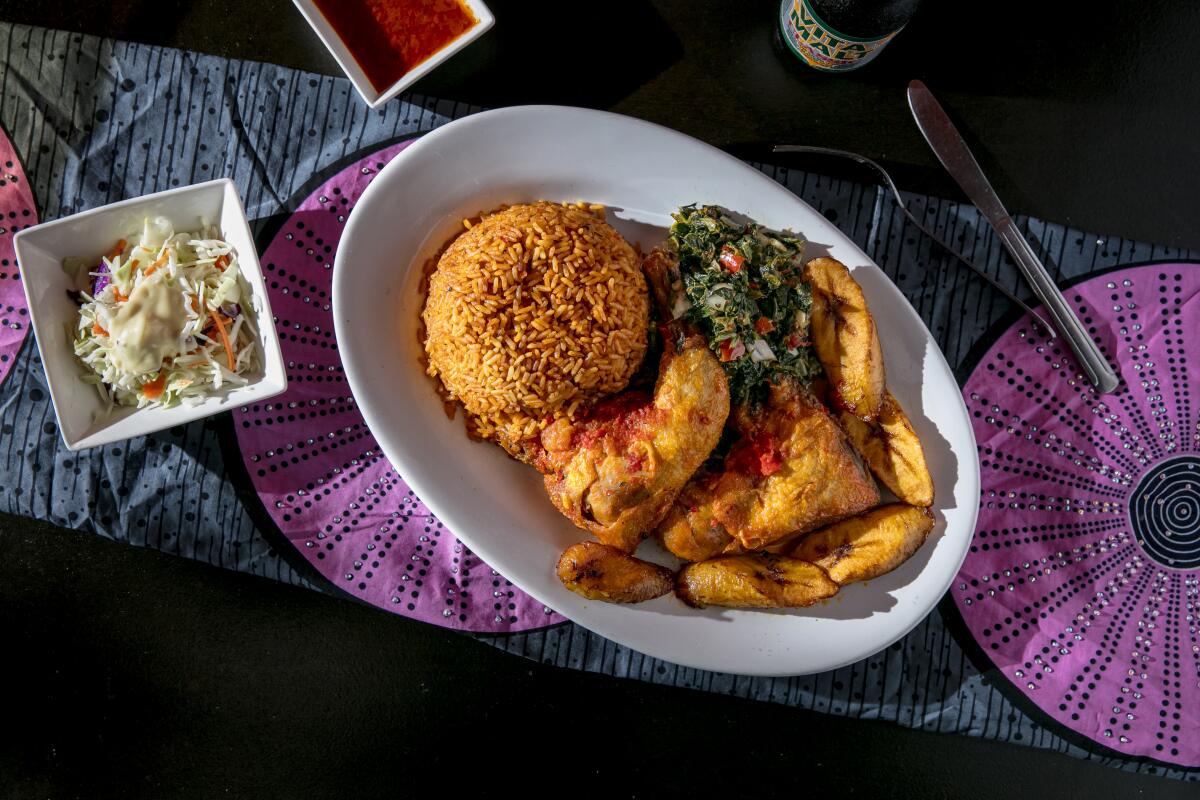
People of all backgrounds stop by Aduke; the Nigerians and Ghanaians who dine here disappear into their plates with expressions that resemble relief. I learn where they’re from because diners tend to be friendly and chat with one another: Oyetibo is making every plate to order, often by herself, and it can take 45 minutes or so for your food to arrive.
If your hunger is urgent, ask for moin moin (also known as moi moi), a steamed pudding made from pureed black-eyed peas that sped out of the kitchen during my meals. Its glossy, pleasant sponginess brings to mind ankimo, the steamed monkfish liver dish prized at sushi bars, though of course the flavor of moin moin, seasoned with garlic and red pepper, intones the land rather than the sea.
Otherwise, settle in and sip zobo, a gingery drink dyed deep purple from hibiscus, or effervescent palm wine. Oyetibo’s warm presence and heartening cooking will show in due time. They merit the wait.
Aduke African Cuisine
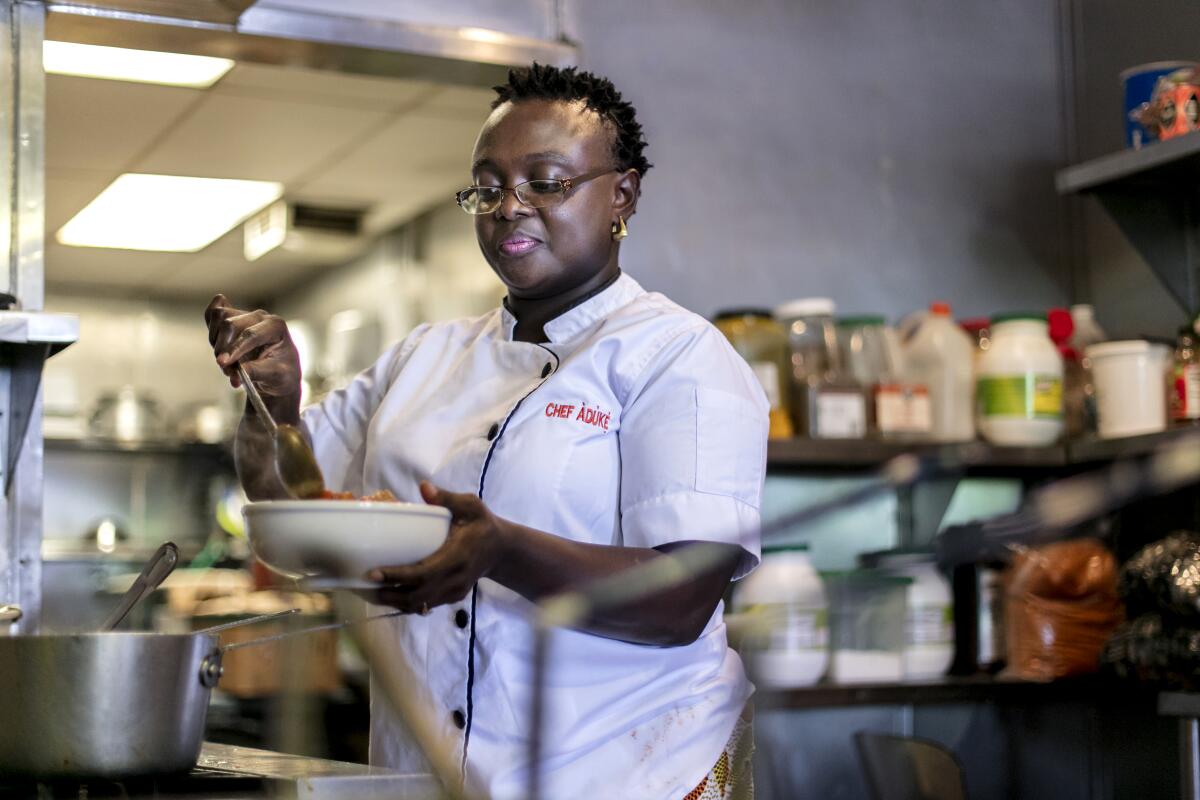
If You Go
Aduke African Cuisine
More to Read
Eat your way across L.A.
Get our weekly Tasting Notes newsletter for reviews, news and more.
You may occasionally receive promotional content from the Los Angeles Times.

